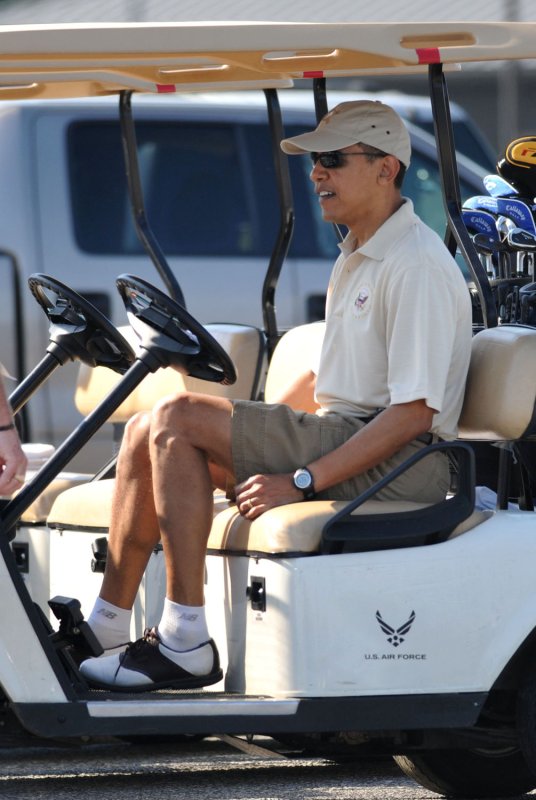1 of 2 | President Barack Obama sits in his golf cart prior to playing golf at Andrews Air Force Base in Maryland on April 26, 2009. (UPI Photo/Kevin Dietsch) |
License Photo
WASHINGTON, April 26 (UPI) -- The U.S. Department of Homeland Security said Sunday it has declared a public health emergency in a bid to stop the spread of a swine flu virus.
DHS Secretary Janet Napolitano said at a White House press conference she made the declaration to free up funds to fight the virus' spread, adding the government has moved to release one-quarter of its stockpile of anti-virus medications Tamiflu and Relenza.
Richard Besser, acting director of the U.S. Centers for Disease Control, said his agency has confirmed 20 non-fatal cases of swine flu within the Unites States, including eight cases found among New York City high school students. The other cases were detected in Ohio, Kansas, Texas and seven in California.
"This is moving fast but we view this more as a marathon," Besser told reporters. "We do think that this will continue to spread, but we are taking aggressive action to minimize the impact on people's health."
Napolitano called the declaration of a public health emergency "standard operating procedure" and said she'd rather call it a "declaration of emergency preparedness."
"We're preparing in an environment where we really don't know ultimately what the size of seriousness of this outbreak is going to be," she said.
Besser indicated that the U.S. cases were identical to the swine flu that has been hitting Mexico, where 81 deaths were deemed "likely linked" to the new strain of the virus with more than 1,300 reported ill, CNN reported -- noting 22 students and three teachers in Zealand, who returned from a trip to Mexico, may be infected with the virus.
Canada, South Korea and Japan have issued travel notices or tightened restrictions and the Hong Kong government said certain travelers would be confined to a hospital if they arrive in Hong Kong with a fever and signs of respiratory illness. China and Russia have established quarantine procedures, and some countries have banned pork imports from Mexico -- despite assurances from health professionals that the flu is not linked to food products.
The World Health Organization said although the outbreak is "a public health emergency of international concern," it will wait until Tuesday to decide whether to elevate the alert level, The New York Times reported.
The CDC said it has deployed experts to Texas and San Diego County and Imperial County, Calif., for epidemiologic field investigations. All the U.S. patients have recovered or are expected to.
The viruses contain a unique combination of gene segments not reported previously among swine or human influenza viruses in the United States or elsewhere.















